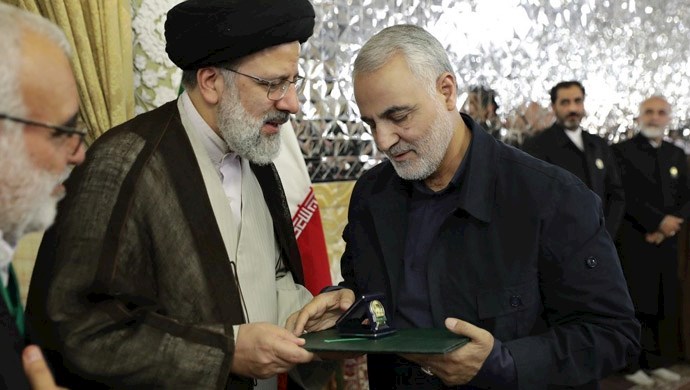Analysis by PMOI/MEK
Iran, June 5, 2021—"Freedom happens under the light of security / I deeply believe in freedom of thought, speech, and press" said Ebrahim Raisi according to the Mashregh daily, on May 31.
A career of prosecution
When Ebrahim Raisi, the only serious candidate in the Iranian regime’s upcoming masquerade of presidential election, wants to describe his resume, the most prominent words he uses are "prosecutor" and "judiciary" in it.
"I was honored that due to the conditions of the beginning of the victory of the Islamic Revolution and the words of our great Imam (Ruhollah Khomeini), in my youth, I was about 20 years old, I was the prosecutor of a large city in the country, the prosecutor of Karaj (west of Tehran) then I became the prosecutor of the province and then for a period of several years I was the prosecutor of Tehran. During a ten-year term, I was the head of the National Inspection Agency, and in another ten-year term, I was the first deputy of the head of the judiciary. I was also the Attorney General for a year and a half. And today, I have the honor of serving the people as a small servant in the position of head of the judiciary, which is one of the three branches of the country," Raisi said on May 31.
By "the conditions of the beginning of the victory of the Islamic Revolution," Raisi refers to the early 1980s, in which the regime arrested, tortured, and executed thousands of political prisoners.
Using the phrase "the words of our great Imam" he also refers to Khomeini's criminal Fatwa for the massacre of more than 30,000 political prisoners in 1988, in which he played a key role.
From his youth to the age of 60, his mission has been nothing but butchering people. He is still proud that in his position as a judge, he can decide for the death of human beings.
Raisi, member of the "Death Committee"
Here’s what it means to be "prosecutor" and "judge" in the Iranian regime:
According to prisoners who were in Evin prison cells on July 28, 1988, on the first day of the 1988 massacre, the death committee was placed in the courthouse near the meeting room. The death committee was a trio of officials appointed by Khomeini to try all political prisoners.
The prisoners were brought to the courthouse blindfolded, and after being identified and sentenced to death by Hossein Ali Nayeri, Ebrahim Raisi, and Mostafa Pourmohammadi, they were transferred to the basement of Ward 209, where they were hanged in groups.
After a few days, in order to speed up the execution as much as possible, the distance between the courthouse and the Ward 209 cells was reduced and the entire process was carried out in the same building.
One of the prisoners said, "Prisoners were brought to Ward 209 from different wards for trial, and after the trial, they were transferred to solitary confinement in the sanatorium and taken to the basement of 209 in order to be executed. There, a room was set aside for the Judgment Enforcement Branch. The prisoner was first taken to this room, where he was sentenced to death and given two black plastic bags, told to put his belongings in one, and if he had a will, write it down and put it in the other. Then a thick black marker was given to prisoners and they were told to write their name clearly on their forearm before being led to the execution room in a humiliating way. In the execution room, a hanging pole was installed with two legs, which contained five ropes. Under each rope there was a chair or a stool. The guards they took the blindfolded prisoners on top of the chairs and threw the noose around their necks. Then they kicked them off the chair while shouting ‘Allah is great.’”
This is just one example of a crime whose full details remain to be revealed.
Of course, the freedom Raisi believes in goes beyond "security." The key word “security” in this regime is something everyone understands. He means the suppression and killing of freedom lovers to preserve the mullahs’ rule. In the executioners’ culture, words must be interpreted inversely to reach their true meanings. Just as Raisi describes himself as "kind and sensitive," his reality is the complete opposite.
"My wife and children believe that I am very kind at home and very sensitive to my organizational, administrative work and responsibilities."
What is certain is that regime supreme leader Ali Khamenei is reaching the end of his rule has no choice but to select the executioner of the 1988 massacre as his next president. Khamenei knows very well that he has no recourse to the human world and his only possible path is to cast his lot with criminals like himself.
Will Khamenei’s regime go down with Raisi at the helm? This is a question that the rapidly evolving events will soon answer.





